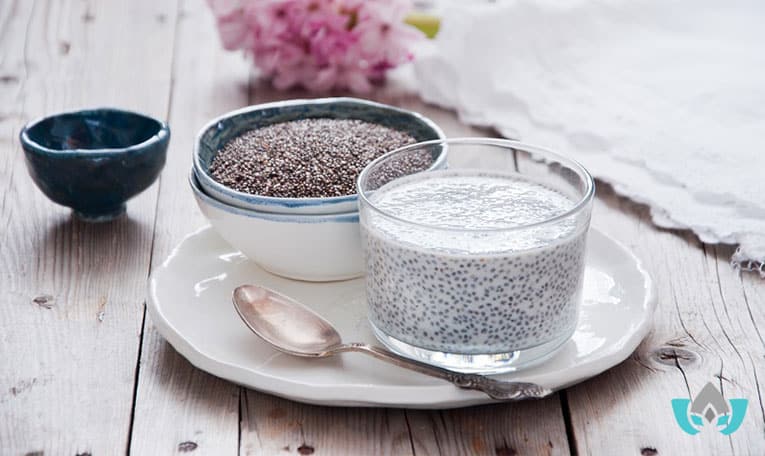
There are a number of essential compounds your body needs for optimal health, and omega-3 fatty acids are on that list.
You may have heard of these healthy fats due to their reputation for reducing inflammation, but there’s so much more they can do.
Whether you’re looking for natural solutions to manage anxiety, an immune system boost, or ways to improve your heart health, omega-3 fatty acids may be the natural treatment for you.
Let’s dive into all there is to know about omega-3s: what they are, how they benefit your health, and how you can ensure you’re providing your body with sufficient amounts of these essential fats.
What Are Omega-3 Fatty Acids?
Omega-3 fatty acids are a family of essential fats, meaning your body requires them to function; however, your body cannot produce them and must obtain omega-3s from your diet.
They play many important roles when it comes to your health, from assisting brain function to improving eye health, fighting inflammation, and preventing diseases such as heart disease and cancer.
Naturopathic doctors frequently recommend omega-3 fatty acids because of their myriad health benefits – but more on those later.
There are three main types of omega-3 fatty acids — keep reading for a breakdown of the health benefits and functions of each omega-3.
1. Alpha-Linolenic Acid (ALA)
Alpha-linolenic acid, or ALA, is the most common omega-3 in your diet.
It is a short-chain fatty acid used as an energy source, though your body can convert small amounts into one of the other two types of omega-3s, which bring different health benefits.
ALA is found in the following foods:
- Chia seeds
- Flax seeds
- Hemp seeds
- Walnuts
- Flaxseed oil
- Canola oil
- Soybeans
2. Eicosapentaenoic Acid (EPA)
EPA, also known as eicosapentaenoic acid, is an omega-3 fatty acid found in marine products such as fish oil and fatty fish like salmon and tuna.
Some microalgae are also known to contain EPA.
This long-chain fatty acid is often used to reduce triglyceride levels, and small amounts of it may be converted to DHA.
3. Docosahexaenoic Acid (DHA)
The third omega-3 fatty acid, docosahexaenoic acid or DHA, is considered to be the most crucial of the three.
DHA is a main structural component of many body parts, including your brain and your retinas.
Like EPA, this long-chain fatty acid is found in fatty fish-based products as well as eggs, meat, and dairy from grass-fed animals.
Sufficient DHA levels may be an issue for vegans and vegetarians, which is why microalgae supplements are recommended.
What Is The Omega-6 To Omega-3 Ratio?
Although you’ve probably heard of omega-3s, there’s a chance you haven’t heard of omega-6 fatty acids.
Omega-6 fatty acids are similar to omega-3s in that they produce eicosanoids, signaling molecules that affect blood clotting and inflammation.
However, where omega-3s reduce inflammation, it’s thought that too many omega-6s may exacerbate inflammation and counteract the health benefits of omega-3 fatty acids.
It’s important to maintain a balance between both types of essential fatty acids, which may be difficult — the average Western diet tends to have more omega-6s than omega-3s.
The optimal omega-6 to omega-3 ratio is 4:1 or less, and the Western diet varies between 10:1 and 50:1.
Overall, it’s recommended to increase intake of omega-3s through dietary and supplementary means.

Benefits Of Omega-3 Fatty Acids
The health solutions omega-3s can provide are wide-reaching, affecting nearly every system of your body.
Let’s look at some of the specific benefits of each type of omega-3 fatty acids.
1. They’re A Natural Solution For Anxiety And Depression
Anxiety and depression are two increasingly common mental disorders, and there are many contributing factors that may be worsening symptoms like fatigue, worry, sadness, and stress.
Ensuring your body has enough omega-3 fatty acids may help ease symptoms and fight depression and anxiety.
Low omega-3 levels and high omega-6 levels have been linked to inflammation and depression, and supplementation with omega-3 fats has shown a reduction in inflammation and anxiety, even in healthy young adults.
EPA and DHA specifically have proven to benefit those with depression and/or anxiety, with EPA specifically proving to be an effective treatment for depression.
2. They’re A Natural Sleep Aid
If you’re having trouble falling or staying asleep, you aren’t alone.
Sleep quality is immensely important for your overall health, but it can be difficult to figure out what’s causing your sleeplessness.
Omega-3 fatty acids may be an important contributing factor in helping you get good quality sleep.
Low DHA levels are linked to low melatonin levels, which is a hormone produced by your pineal gland that regulates your natural sleep-wake cycle.
This 2014 study looked at the relationship between omega-3s and sleep by providing control groups with regular fatty fish consumption.
It found the EPA and DHA present in fish resulted in a positive impact on sleep quality, sleep latency, and overall daily functioning.
3. They’re A Natural Immune System Enhancer
The immune system is your body’s natural defence system, protecting you from illness and infection.
Although omega-3 fatty acids do help to reduce inflammation thereby reducing the strain and stress on your immune system, omega-3s also provide other immune benefits.
New research has shown DHA and EPA provide not only a reduction of inflammation but they also help boost the function of immune cells.
These immune cells, specifically known as B lymphocytes, are white blood cells that secrete antibodies and signal your immune system to target and destroy pathogens.
The above study found DHA-rich fish oil enhanced B cell activation, thereby increasing antibody production and assisting immune response.
Additionally, omega-3 fatty acids taken early in life may help reduce the risk of developing an autoimmune disease, and later in life may help reduce symptoms of conditions like psoriasis, rheumatoid arthritis, and lupus.
4. They Help Reduce Chronic Inflammation
Inflammation is your body’s natural response to infection or damage, but sometimes it sticks around too long or persists where there is no infection.
This is also known as chronic inflammation.
Longterm chronic inflammation can contribute to many other illnesses and diseases including cancer and heart disease.
Omega-3s can help your body reduce and heal inflammation by reducing the production of problematic compounds and molecules such as cytokines and inflammatory eicosanoids.
Supplementation of omega-3 fatty acids has shown a significant decrease of numerous pro-inflammatory cytokines and substances, especially when the supplements are taken long-term.
5. They’re Good For Your Heart
Ensuring the long-term health of your heart is incredibly important, considering how strokes and heart attacks are the #1 leading cause of death around the world.
The heart health benefits of omega-3 fatty acids were first observed when researchers noted low rates of heart disease in communities that consume large amounts of fish.
Now, we know why omega-3s are so good for your heart.
EPA and DHA have proven to reduce blood pressure, raise your “good” HDL cholesterol levels, reduce blood clots, and keep your arteries clean of plaque.
They may also reduce triglycerides, a type of fat found in your blood that may contribute to arteriosclerosis and increase your risk of heart disease and stroke.
Regular fish consumption is recommended by the American Heart Association to decrease your risk of developing heart disease.
Dietary Sources Of Omega-3 Fatty Acids
Fish oil supplements are a good and viable option for many, but it’s also important to include as many omega-3 fatty acids in your diet as possible.
Fatty fish such as salmon, tuna, and mackerel are all great dietary sources of omega-3s, as well as other types of seafood.
However, mercury content in fish is a big problem; keep consumption to 2 to 3 servings per week of low-mercury fish (salmon and sardines mainly), and avoid high-mercury fish like king mackerel and tuna.
Nuts and seeds such as flax, chia, hemp, and walnuts are also high in omega-3 fats.
Some products are fortified with omega-3 fatty acids as well, so keep an eye out next time you’re at the supermarket.
Book An Appointment At The Mindful Healing Clinic
The health benefits of omega-3 fatty acids cannot be understated, which is why it’s important to ensure you’re consuming enough of these essential fats on a daily basis.
From cognitive function to immune health, omega-3s are a crucial tool in your journey to optimal health.
Especially in these tumultuous times when anxiety and stress levels are high — there are naturopathic options to help ease both the mental and physical discomfort.
For more information on fatty acids and other naturopathic solutions for your health and well-being, contact us at The Mindful Healing Clinic.
We would love to work with you on a personalized all-natural treatment plan that works for you and your body.
Book an appointment with us at The Mindful Healing Clinic today — we can help.
Until next time,
Dr. Maria Cavallazzi, N.D
Mindful Healing Naturopathic Clinic
Mississauga, ON L5M 1L7
(905) 819-8200
► https://g.page/MindfulClinicNaturopathic
Dr. Maria Cavallazzi is a medical doctor from Colombia where she practiced as a family physician for 8 years until she moved to Canada 16 years ago and became a naturopathic doctor in Mississauga.


